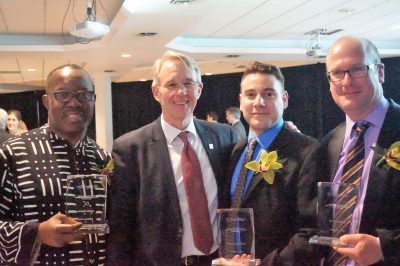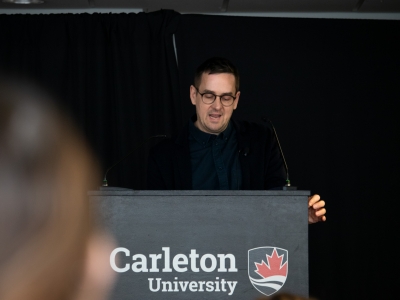
Professor Otiono (left) posing with Provost Peter Ricketts and award winners Professor Christopher Dieni and Professor Martin Geiger.
Assistant Professor Nduka Otiono’s teaching methods begin with a simple formula: he’s passionate about African literature and culture and he’s eager to share it with his students.
“I’ve been fortunate to design courses that aren’t dry and academic, but interdisciplinary, and which represent my social commitment as an artist and intellectual,” explains the assistant professor in the Institute of African Studies.
A well-known journalist, writer, and poet from Nigeria, Professor Otiono strives to connect with his students—through the language of Youtube, blogs, Skype, and social media.
“The classroom is a theatre for applied knowledge learning. If they can advance their beliefs by working on things they believe in, they find joy. And when we connect, it’s a joy for me,” he says. “We have a lot of fun.”
The experience extends beyond the classroom into research as well, with the students hosting an undergraduate research conference, which attracted students from across North America. Some undergraduates have had articles accepted in the peer-reviewed journal Nokoko.
These efforts contributed to Professor Otiono’s successful nomination for the Capital Educators’ Award. He won alongside Assistant Professor Martin Geiger of the Department of Political Science and the Institute of European, Russian and Eurasian Studies. (Read his story here.)
In the nomination, one of his students wrote, “In (Professor Otiono’s) class, for the first time in university (she’s going to her final year), I became inspired to learn and to push myself out of bounds creatively, purely for the joy of acquiring new knowledge. Professor Otiono approached each course topic with a passion and fervour, and one cannot help but be excited.”
Partnership in Nigeria
Professor Otiono’s hope is to continue to share that passion with faculty and students in his native country of Nigeria as well. In 2015, he was awarded the Carnegie African Diaspora Fellowship , which pairs African diaspora scholars with higher education institutions in Africa to collaborate in areas that include curriculum co-development, research, graduate teaching, training and mentoring activities.
In Summer 2015, he worked with G.G. Darah, a professor of English at Delta State University (DELSU) in Nigeria, and the president of the Nigeria Oral Literature Organization, toward establishing a working group for researching the oral literature, folklore and folklife of the Niger Delta people and beyond.
In Summer 2016, Professor Otiono will return to continue working with faculty and graduate students at the Nigerian institution. He says he was struck by the differences between DELSU and Carleton.
“While there are increasing numbers of students involved in the educational process in Nigeria, there hasn’t been a commensurate expansion of infrastructure to accommodate them,” he explains. “For instance, there are few books. Lots of students depend on cell phones for their research.”
Although he has organized a book drive for DELSU and is donating a projector, Professor Otiono is hesitant to subscribe to the “international savior syndrome”. He points out that the experience is enriching his work, as well, as he immerses himself in perspectives far removed from the Carleton campus.
Friday, June 3, 2016 in Institute of African Studies, International, News
Share: Twitter, Facebook



